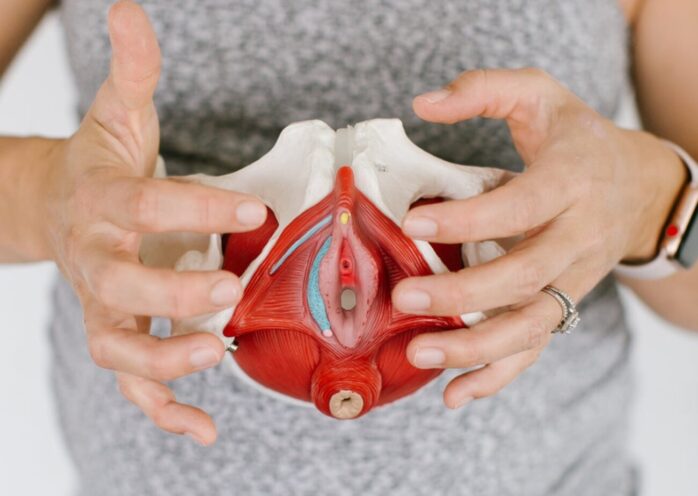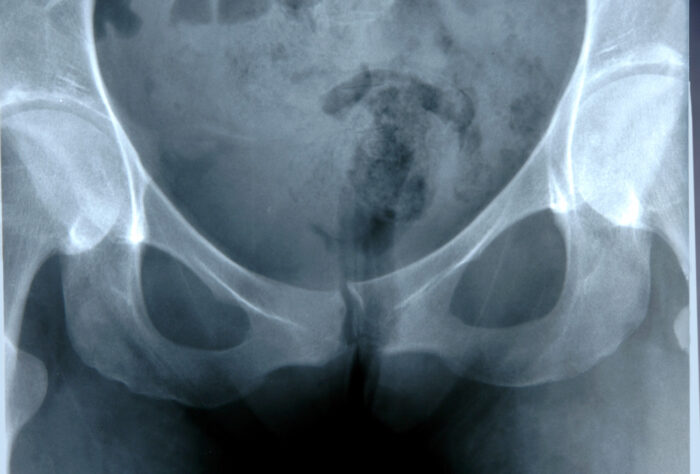
Did you know there are over 650 muscles in the human body? We talk about working out so often, but it’s time to focus on working out the pelvic floor. Oftentimes, people only know that the pelvic floor exists due to pregnancy or in terms of kegel exercises. When you hear people talk about kegels, it’s usually in reference to having a tighter vagina. However, the pelvic floor is important in many different aspects. Having a stronger pelvic floor can be beneficial in your normal day to day life, as well as in your sex life!
What Are the Benefits of a Stronger Pelvic Floor?
Your pelvic floor supports many functions in your body. From your urethra and bladder, your vagina, cervix, uterus, and even your rectum, the pelvic floor needs to be spoken about more. It even stabilizes the pelvic bones, which is very important. The pelvic floor is a vital muscle, and can lose strength over time if you don’t take care of it.
The pelvic floor essentially helps your most important bodily functions and keeps most of our functions working as they should. If they collapse, it’s very serious and dangerous. Plus who wants surgery and who wants to wear pads due to incontinence?

So what should you know about your pelvic floor?
It can actually be too tight!
If you are suffering from constant yeast or bladder infections, you may actually have pelvic floor muscles that are too tight. This can be determined by going to a pelvic floor therapist. They can be too tight for a variety of reasons, some including anxiety, as well as stress. In this case, you’ll need to use a dilator to stretch and tone the pelvic floor. This is actually a very common issue that also causes pain or inability to have sex, but it is unfortunately not talked about often. Doing too many kegels can cause this, as well as trauma from sexual abuse. Pelvic floor muscles being too tight can also cause hip pain, bladder pain, and other sexual dysfunctions. Without going to a pelvic floor therapist, you may be told you have vulvodynia, and feel like there is no easy solution. Don’t worry – with patience, this problem can easily be solved.
The pelvic floor can also be too loose
Do you pee a little when you laugh, cough, or sneeze? This is typically due to a loose pelvic floor. A weak pelvic floor means less control over your bladder. This can also affect you by causing you to go poop without meaning to. Loose pelvic floors can also cause back pain, abdominal pain, and even prevent effective orgasms.
What can cause pelvic floor weakness? For starters, pregnancy. However, a lack of exercise, aging, and even being overweight can cause this. However, pelvic floor training can easily help boost your pelvic floor muscle mobility, strength, and stability.

Factors that affect pelvic floor health
The pelvic floor, an often overlooked and undervalued part of the body, plays a crucial role in a person’s overall health and well-being. However, various factors can negatively impact its health and function, leading to issues such as incontinence, pain, and even pelvic organ prolapse.
Childbirth, particularly vaginal delivery, can strain and weaken these muscles. As women age, hormonal changes, such as menopause, can also take a toll. Excessive weight and obesity can put added pressure on it, exacerbating any existing issues.
Inactivity and sedentary lifestyles can also lead to pelvic floor problems, as the muscles require regular physical activity to remain strong and healthy. Certain medical conditions, such as neurological disorders, can also impact these muscles function.
It’s important to take proactive measures to support your health. This can include regular exercise, such as kegel exercises and weightlifting, maintaining a healthy weight, and seeking treatment for any underlying medical conditions. Avoiding habits that put excessive strain on the it, such as smoking and heavy lifting, can also help.
Overall, taking care of these muscles is key to maintaining overall health and well-being. By recognizing the factors that can affect its health and taking proactive measures to support it, you can help keep this critical part of your body functioning optimally for years to come.
Kegels can help, but they can also hurt!
Kegels were developed in the 1940’s, specifically for women dealing with issues after childbirth. Kegels are easy to do, and essentially involve you squeezing your pelvic floor as if you are starting and stopping the flow of urine. It’s important to go over this with a pelvic floor therapist to ensure you are getting the right muscle, as to avoid any issues. You can also speak to them to see if you should use weighted kegel balls, egg vibrators, vaginal toys, love eggs, or any other aid to assist you. The reason kegels can be bad is because if your pelvic floor is too tight, this can actually be counterproductive and make the issue worse.
One thing of interest is that in Europe, it’s normal to visit a pelvic floor therapist both before and after pregnancy. In fact, it’s almost as normal as a gynecologist appointment. If women in America took the time to make this more commonplace, it may actually help those who don’t know that this is the root cause of issues for them be able to get adequate and appropriate care. Your pelvic floor is absolutely vital for many functions, and should be talked about way more often. Don’t allow social stigmas to shame you from getting the care that you need and deserve.
To Get the Best Sex Toys Visit

Conclusion
It’s important to be aware of the factors that can affect the health of these muscles as it plays a crucial role in a person’s overall well-being. From aging and childbirth to obesity and sedentary lifestyle, there are many things that can weaken these muscles and lead to various health issues. By understanding these factors and taking steps to prevent or address them, individuals can help to maintain the strength and function of them, improve their quality of life, and reduce their risk of developing related health problems. Regular exercise, maintaining a healthy weight, and seeking medical attention when necessary can all be effective ways to support pelvic floor health.











